英语作文西方节日和中国传统节日
中国传统节目英语作文范文示例
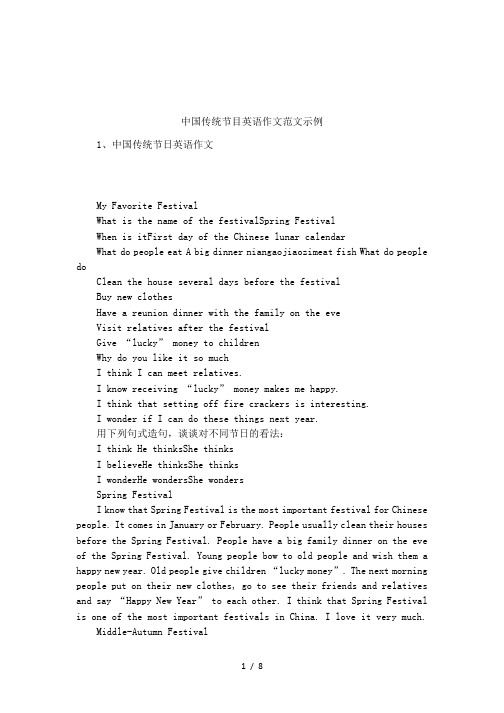
中国传统节目英语作文范文示例 1、中国传统节日英语作文My Favorite Festival What is the name of the festivalSpring Festival When is itFirst day of the Chinese lunar calendar What do people eat A big dinner niangaojiaozimeat fish What do people do Clean the house several days before the festival Buy new clothes Have a reunion dinner with the family on the eve Visit relatives after the festival Give “lucky” money to children Why do you like it so much I think I can meet relatives. I know receiving “lucky” money makes me happy. I think that setting off fire crackers is interesting. I wonder if I can do these things next year. 用下列句式造句,谈谈对不同节日的看法: I think He thinksShe thinks I believeHe thinksShe thinks I wonderHe wondersShe wonders Spring Festival I know that Spring Festival is the most important festival for Chinese people. It comes in January or February. People usually clean their houses before the Spring Festival. People have a big family dinner on the eve of the Spring Festival. Young people bow to old people and wish them a happy new year. Old people give children “lucky money”. The next morning people put on their new clothes, go to see their friends and relatives and say “Happy New Year” to each other. I think that Spring Festival is one of the most important festivals in China. I love it very much. Middle-Autumn Festival1/8People believe that the Middle-Autumn Festival is one of the most traditional Chinese festivals, it is often celebrated in September or October. During the festival, family members get together and eat moon cakes. There are many kinds of delicious moon cakes. I think they are very delicious. On the evening of the Middle-Autumn Festival, people can enjoy the full moon in the dark sky. I like Mid-Autumn Festival because it makes me happy. Dragon Boat Festival The D ragon Boat Festival is a traditional festival in China. There’s a folk story about this festival. Many years ago, There was a poet called Qu Yuan. He loved his country very much. However, the king asked him to leave the country. He felt very sad. When he learned that another country had seized his country, he didn’t want to live any more.On the fifth day of the fifth lunar month, he jumped into Miluo River. The local people rowed the boat to save him, but it was too late. They didn’t want the fish to eat his body, So they dropped rice balls into the river. Nowadays, on this day, we watch dragon boat races and eat ZONGZI in memory of Qu Yuan. 2、西方的主要节日 Festivals in the West 大学英语作文 西方的主要节日 Festivals in the West 大学英语作文 Christmas comes on December 25th. It’s the most important festival of the year in the western world. At Christmas time, schools, shops and offices close for holiday period, so people can spend time at home with their families. Nowadays, Christmas is celebrated by westerners and Americans by sending gifts and Christmas cards, preparing delicious food, and decorating homes with colorful lights and Christmas trees. 圣诞节在十二月二十五日。
中外节日异同英语作文
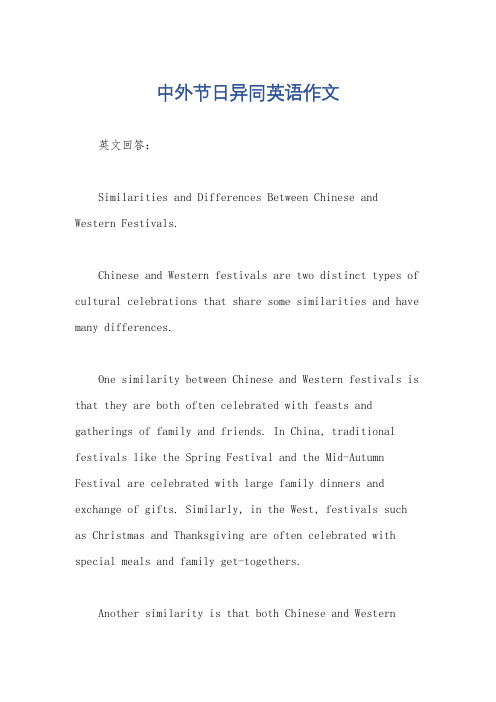
中外节日异同英语作文英文回答:Similarities and Differences Between Chinese and Western Festivals.Chinese and Western festivals are two distinct types of cultural celebrations that share some similarities and have many differences.One similarity between Chinese and Western festivals is that they are both often celebrated with feasts and gatherings of family and friends. In China, traditional festivals like the Spring Festival and the Mid-Autumn Festival are celebrated with large family dinners and exchange of gifts. Similarly, in the West, festivals such as Christmas and Thanksgiving are often celebrated with special meals and family get-togethers.Another similarity is that both Chinese and Westernfestivals often involve traditional music and dance. In China, traditional festivals are often accompanied bylively lion dances, dragon dances, and opera performances. In the West, festivals like Christmas and Easter often feature carols, hymns, and traditional folk dances.However, there are also many differences between Chinese and Western festivals. One of the most significant differences is the timing of the festivals. Chinese festivals are often based on the lunar calendar, while Western festivals follow the solar calendar. This meansthat the dates of Chinese festivals change from year to year, while the dates of Western festivals remain the same.Another difference is the purpose or significance of the festivals. Chinese festivals are often rooted in Chinese history, mythology, and religious beliefs. For example, the Spring Festival celebrates the beginning of the new year according to the lunar calendar, while theMid-Autumn Festival celebrates the harvest and the moon. In contrast, Western festivals are often based on Christian or other religious beliefs. For example, Christmas celebratesthe birth of Jesus Christ, while Easter celebrates his resurrection.Finally, there are differences in the way that Chinese and Western festivals are celebrated. Chinese festivals are often celebrated publicly with large-scale events and displays. For example, the Spring Festival is celebrated with fireworks, parades, and traditional performances. In contrast, Western festivals are often celebrated privately within families and communities. For example, Christmas is often celebrated with a family gathering around a decorated Christmas tree.中文回答:中国和西方节日异同。
中西方节日对比英语作文简单

中西方节日对比英语作文简单中文回答:中西方节日对比。
中文回答:我将比较中西方的节日,探讨他们的相似之处和不同之处。
中文的节日有春节、清明节、端午节、中秋节等等,而西方的节日有圣诞节、复活节、感恩节等等。
英文回答:When it comes to comparing Chinese and Western festivals, there are both similarities and differences to consider. In China, we celebrate festivals such as the Spring Festival, Qingming Festival, Dragon Boat Festival, and Mid-Autumn Festival, while Western countries have holidays like Christmas, Easter, and Thanksgiving.中文回答:首先,中西方节日都是为了庆祝特定的事件或传统。
例如,春节是中国最重要的节日之一,它庆祝新年的开始,家人团聚,互赠红包和祝福。
类似地,圣诞节是西方国家最重要的节日之一,庆祝耶稣的诞生,人们会装饰圣诞树,交换礼物,与家人和朋友共度时光。
英文回答:Firstly, both Chinese and Western festivals are celebrated to mark specific events or traditions. For example, the Spring Festival is one of the most important festivals in China, celebrating the start of the new year with family reunions, red envelopes, and well wishes. Similarly, Christmas is one of the most significant holidays in Western countries, commemorating the birth of Jesus with the decoration of Christmas trees, exchanging gifts, and spending time with family and friends.中文回答:其次,中西方节日都有特定的食物和饮品与之相关联。
英语作文:中西方传统节日文化的碰撞
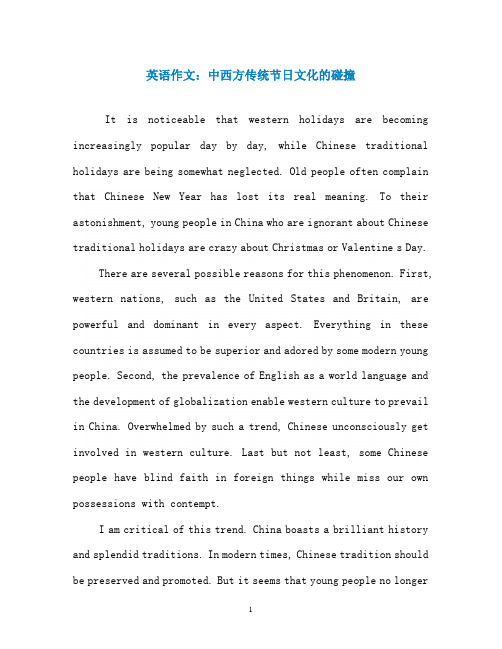
英语作文:中西方传统节日文化的碰撞It is noticeable that western holidays are becoming increasingly popular day by day, while Chinese traditional holidays are being somewhat neglected. Old people often complain that Chinese New Year has lost its real meaning. To their astonishment, young people in China who are ignorant about Chinese traditional holidays are crazy about Christmas or Valentine s Day.There are several possible reasons for this phenomenon. First, western nations, such as the United States and Britain, are powerful and dominant in every aspect. Everything in these countries is assumed to be superior and adored by some modern young people. Second, the prevalence of English as a world language and the development of globalization enable western culture to prevail in China. Overwhelmed by such a trend, Chinese unconsciously get involved in western culture. Last but not least, some Chinese people have blind faith in foreign things while miss our own possessions with contempt.I am critical of this trend. China boasts a brilliant history and splendid traditions. In modern times, Chinese tradition should be preserved and promoted. But it seems that young people no longertreasure the traditions. On the contrary, they turn to pursue enthusiastically a supposedly more modern culture. If this trend is allowed to continue, the priceless heritage of our ancestors will be replaced by western traditions. Nobody expects such a consequence. So let s join hand in hand to protect Chinese tradition, especially traditional holidays.。
中西方传统节日保持平衡英语作文80词
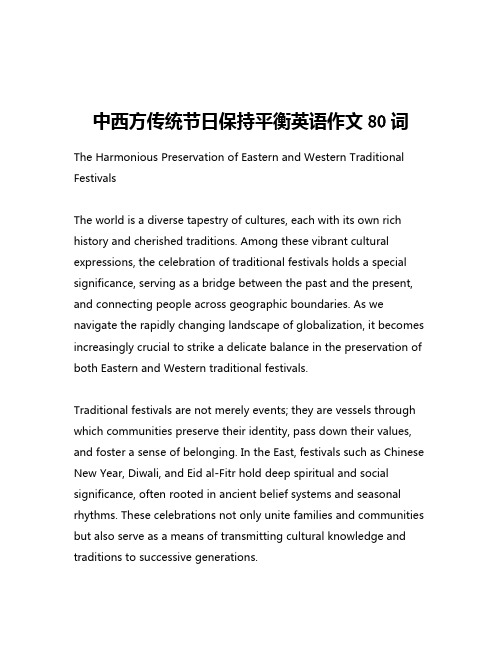
中西方传统节日保持平衡英语作文80词The Harmonious Preservation of Eastern and Western Traditional FestivalsThe world is a diverse tapestry of cultures, each with its own rich history and cherished traditions. Among these vibrant cultural expressions, the celebration of traditional festivals holds a special significance, serving as a bridge between the past and the present, and connecting people across geographic boundaries. As we navigate the rapidly changing landscape of globalization, it becomes increasingly crucial to strike a delicate balance in the preservation of both Eastern and Western traditional festivals.Traditional festivals are not merely events; they are vessels through which communities preserve their identity, pass down their values, and foster a sense of belonging. In the East, festivals such as Chinese New Year, Diwali, and Eid al-Fitr hold deep spiritual and social significance, often rooted in ancient belief systems and seasonal rhythms. These celebrations not only unite families and communities but also serve as a means of transmitting cultural knowledge and traditions to successive generations.Similarly, in the West, festivals like Christmas, Thanksgiving, and Halloween have become integral parts of the cultural fabric, each with its unique customs, symbols, and rituals. These festivals not only bring joy and merriment but also provide opportunities for people to come together, celebrate shared values, and strengthen social bonds.As globalization accelerates the exchange of ideas, goods, and people across borders, the need to maintain a balance between preserving traditional festivals and adapting to changing times becomes increasingly apparent. On the one hand, the exposure to diverse cultural traditions can enrich and expand our understanding of the world, leading to greater appreciation and cross-cultural exchange. This can be seen in the growing popularity of Eastern festivals in the West and the increasing awareness of Western festivals in the East.On the other hand, the risk of cultural homogenization and the dilution of traditional values looms large. The commercialization and commodification of festivals, the influence of media and technology, and the pressure to conform to global trends can all contribute to the erosion of the authentic and meaningful aspects of traditional celebrations.To strike a harmonious balance, it is essential to adopt a multifaceted approach that combines the preservation of traditional practices withthe integration of contemporary elements. This can be achieved through several strategies:1. Educating and engaging the younger generations: Ensuring that traditional festivals are not just observed but also understood, appreciated, and actively participated in by the youth is crucial for their long-term preservation. This can be accomplished through school programs, family traditions, and community-based initiatives that foster a deep connection with cultural heritage.2. Adapting traditions to modern contexts: While maintaining the core essence of traditional festivals, it is necessary to adapt certain aspects to reflect the changing social, economic, and technological landscape. This could involve incorporating new elements that resonate with the current generation, while still preserving the fundamental traditions.3. Promoting cross-cultural exchange and understanding: Encouraging open dialogues, cultural festivals, and educational initiatives that facilitate the mutual understanding and appreciation of Eastern and Western traditional celebrations can help bridge the gap between diverse cultures and promote a more inclusive and harmonious global community.4. Protecting and revitalizing intangible cultural heritage:Governments, cultural institutions, and local communities should work together to safeguard the intangible aspects of traditional festivals, such as rituals, music, dance, and culinary traditions, ensuring their continuity and vitality.5. Fostering sustainable and eco-friendly practices: As we strive to preserve traditional festivals, it is crucial to consider the environmental impact of our celebrations and adopt sustainable practices that minimize waste, conserve resources, and promote environmental stewardship.By embracing these strategies, we can achieve a delicate balance in the preservation of Eastern and Western traditional festivals, ensuring that these cherished cultural legacies continue to thrive and inspire future generations. In doing so, we not only honor our past but also pave the way for a future where diverse cultures coexist in harmony, enriching the human experience and fostering a deeper understanding of our shared humanity.。
对传统节日和西方节日的看法 英语作文

对传统节日和西方节日的看法英语作文全文共6篇示例,供读者参考篇1Holidays are the Best! Views on Traditional and Western CelebrationsHolidays are awesome! I love holidays because they mean no school, staying up late, eating yummy food, and getting presents sometimes. There are so many fun holidays throughout the year to look forward to.In my family, we celebrate a mix of traditional Chinese holidays and Western holidays. The traditional holidays connect me to my culture and ancestors. The Western ones are fun too though, especially the ones with Santa Claus!One of my favorite traditional holidays is Chinese New Year. I love the red decorations, firecrackers, lion dances, and getting lucky money in red envelopes from my relatives. My parents always remind me the traditions represent good luck, prosperity, and honoring our family. I enjoy helping my mom make dumplings and other special foods for our New Year's Eve feast.After Chinese New Year, the next big traditional holiday is the Qingming Festival in early April. We visit the graves of our ancestors and clean them up. It helps me remember mygreat-grandparents who I never met. My dad buys food offerings like fruits and burns fake paper money and other goods so our ancestors receive them in the afterlife. It seems kind of weird, but it's an important ritual.In May or June, we celebrate the Dragon Boat Festival by eating sticky rice dumplings called zongzi. The shapes look like little pyramids or missiles! There are competitions of dragon boat racing too, which is basically a long canoe with a dragon head at the front. My uncle's team wins trophies nearly every year.The Mid-Autumn Festival in September is another big one. We eat mooncakes, which are thick pastries stuffed with lotus seed paste or other fillings. I like the ones with salted egg yolk centers the best! We also put lanterns outside to appreciate the bright harvest moon. My brother and I used to light littlehand-held lanterns and carry them around the neighborhood.Aside from those major holidays, there are other smaller traditional festivals too, like the Lantern Festival, Qixi Festival (Chinese Valentine's Day), and the Winter Solstice festival. Somany excuses for feasting on delicious foods and days off from school!As for Western holidays, Christmas is probably my favorite overall. I love the twinkling lights, colorful ornaments, Christmas trees, and receiving presents from Santa Claus. My friends and I have so much fun drafting up lists of toys we hope Santa brings. We leave out milk and cookies for him on Christmas Eve too.Surprisingly, my parents are fans of Halloween, even though it's an American holiday that we don't traditionally celebrate. They think it's fun for me and my brother to dress up in costumes. We go trick-or-treating around the neighborhood and come home with huge plastic pumpkins filled with candy. Last year, I was a zombie pirate while my brother was a mad scientist.Thanksgiving is another Western holiday we partake in because my parents think it's good to have a day focused on being grateful. My dad cooks a turkey with stuffing and potatoes, just like American families. We don't have the whole family over though - it's just the four of us. But it's still nice to pause and remember all the good things we have.I enjoy Valentine's Day too, when people exchange candies and notes with their friends and loved ones. At school, we make little cardboard mailboxes decorated with hearts, and tradeValentine's Day cards with our classmates. If you like someone, you can slip them an extra special note without signing your name. It's fun trying to guess who your secret admirer is!There's also Easter, where my parents hide plastic eggs filled with chocolate or coins around the house and yard. My brother and I have egg hunting competitions to see who can find the most. We also get Easter baskets with chocolates, plush bunnies, and other small gifts.Then in the summertime, there's the 4th of July with backyard barbecues, colorful fireworks, and parades with marching bands and people waving American flags. I like making red, white, and blue popsicles and desserts for the 4th.Holidays are just the best, no matter if they're Chinese traditions or Western celebrations. Each one is filled with its own special foods, customs, decorations, and family activities. I cherish getting to experience such a wide variety of holidays all year round. From feasting to festivals to fireworks, bring on the holiday cheer!篇2Traditional Festivals and Western FestivalsHi everyone! Today, I want to talk about traditional festivals and Western festivals. Festivals are so much fun, right? They bring joy, happiness, and a chance to spend time with our loved ones. Let's explore the similarities and differences between traditional festivals and Western festivals.Traditional FestivalsTraditional festivals are an important part of our culture and heritage. They have been celebrated for many generations and hold a special place in our hearts. In China, we have festivals like the Spring Festival, the Mid-Autumn Festival, and the Dragon Boat Festival.The Spring Festival, also known as Chinese New Year, is the most important festival for Chinese people. It marks the beginning of the lunar calendar and is a time for family reunions. We have delicious food, give and receive red envelopes with money, and set off fireworks to celebrate. It's a time when we show respect to our ancestors and wish for good luck and prosperity in the coming year.The Mid-Autumn Festival is another traditional festival we celebrate in China. It's a time when the moon is at its fullest and brightest. We gather with our families, eat mooncakes, and appreciate the beauty of the moon. We also tell stories aboutChang'e, the lady who lives on the moon. It's a festival of love and togetherness.The Dragon Boat Festival is all about exciting boat races and sticky rice dumplings. We have dragon boat races to honor Qu Yuan, a famous poet in ancient China. We also eat zongzi, which are sticky rice dumplings wrapped in bamboo leaves. It's a festival that celebrates teamwork, bravery, and delicious food!Western FestivalsWestern festivals are celebrated in many countries around the world. They have different traditions and customs, but they are just as fun and exciting as our traditional festivals. Let's take a look at some popular Western festivals.Christmas is one of the biggest festivals in the Western world. It's a time when Christians celebrate the birth of Jesus Christ. People decorate Christmas trees, exchange gifts, and have special meals with their families. We also sing Christmas carols and wait for Santa Claus to bring us presents. It's a festival of love, joy, and giving.Halloween is another popular festival in the West. It's a time when people dress up in costumes, go trick-or-treating, and carve pumpkins into spooky jack-o'-lanterns. We have parties,play games, and tell scary stories. It's a festival of creativity and fun!Thanksgiving is a special festival celebrated in the United States and Canada. It's a time when people give thanks for the blessings in their lives. Families gather together, eat a delicious feast that includes turkey, and express gratitude for the good things that have happened throughout the year. It's a festival of appreciation and reflection.Similarities and DifferencesBoth traditional festivals and Western festivals have their own unique customs and traditions. They bring people together and create a sense of belonging. They also give us an opportunity to learn about different cultures and traditions.One difference between traditional festivals and Western篇3传统节日和西方节日大家好!我是一名小学生,今天我想和大家分享一下我对传统节日和西方节日的看法。
关于传统节日的春节英语作文:中西方节日差异
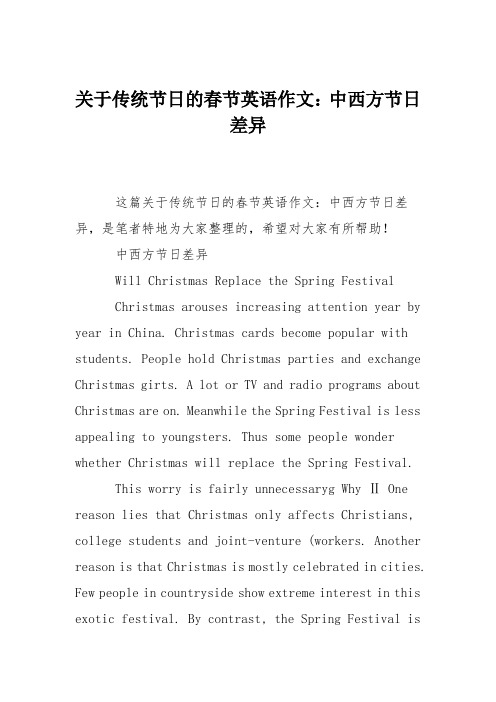
关于传统节日的春节英语作文:中西方节日差异这篇关于传统节日的春节英语作文:中西方节日差异,是笔者特地为大家整理的,希望对大家有所帮助!中西方节日差异Will Christmas Replace the Spring FestivalChristmas arouses increasing attention year by year in China. Christmas cards become popular with students. People hold Christmas parties and exchange Christmas girts. A lot or TV and radio programs about Christmas are on. Meanwhile the Spring Festival is less appealing to youngsters. Thus some people wonder whether Christmas will replace the Spring Festival.This worry is fairly unnecessaryg Why Ⅱ One reason lies that Christmas only affects Christians, college students and joint-venture (workers. Another reason is that Christmas is mostly celebrated in cities. Few people in countryside show extreme interest in this exotic festival. By contrast, the Spring Festival isthe most influential traditional festival in every family.I think, it is natural that with increasing exchanges with the West, a lot of Western holidays have been gradually introduced into China. For us Chinese we should never neglect or even discard our own traditional festivals. For centuries Chinese have observed this traditional holiday to welcome the beginning of a new year. And we will treasure the Spring Festival forever.。
中外节日的英语作文

中外节日的英语作文Title: A Comparison of Chinese and Western Festivals。
Festivals are integral parts of cultures worldwide, reflecting the values, beliefs, and traditions of different societies. In this essay, we will explore and compare some prominent Chinese and Western festivals, highlighting their cultural significance, traditions, and similarities.Firstly, let's delve into Chinese festivals. The Chinese New Year, also known as the Spring Festival, is perhaps the most important festival in Chinese culture. It marks the beginning of the lunar new year and is celebrated with great enthusiasm across China and in Chinese communities around the world. During this time, families gather for reunion dinners, exchange red envelopes containing money (hongbao), and set off fireworks to ward off evil spirits. The festival is also symbolized by the iconic lion and dragon dances, which are believed to bring good luck and prosperity.Another significant Chinese festival is the Mid-Autumn Festival, also known as the Moon Festival. Celebrated on the 15th day of the eighth lunar month, it is a time for families to come together and give thanks for the harvest. One of the central traditions of the Mid-Autumn Festival is the consumption of mooncakes, a dense pastry filled with sweet fillings such as lotus seed paste or red bean paste. Families also gather to admire the full moon and partake in various cultural activities, such as lantern exhibitions and dragon boat races.In contrast, Western festivals often have religious origins but have evolved into secular celebrations over time. One of the most widely celebrated Western festivalsis Christmas, which commemorates the birth of Jesus Christ. While Christmas is a religious holiday for Christians, itis also celebrated by many non-religious individuals as a time for gift-giving, festive decorations, and spending time with loved ones. Traditions associated with Christmas vary across different countries, but common customs include decorating Christmas trees, hanging stockings by thefireplace, and enjoying festive meals.Another notable Western festival is Halloween, which originated from ancient Celtic harvest festivals. Halloween is celebrated on the night of October 31st and is characterized by costume parties, trick-or-treating, and the decoration of homes with spooky motifs like jack-o'-lanterns and cobwebs. It is a time when people embrace the supernatural and indulge in playful scares, often inspired by folklore and horror fiction.Despite their cultural differences, Chinese and Western festivals share some common themes. For instance, both Chinese and Western festivals emphasize the importance of family and community. They provide opportunities for people to come together, strengthen bonds, and create lasting memories. Additionally, many festivals are associated with the changing of seasons and agricultural cycles, reflecting humanity's connection to the natural world and the passage of time.In conclusion, Chinese and Western festivals are richexpressions of cultural heritage, encompassing diverse traditions, customs, and rituals. While they may differ in their origins and practices, they serve similar purposes of fostering unity, celebration, and reflection. By understanding and appreciating the significance of these festivals, we can gain deeper insights into the culturesthat celebrate them and find common ground amidst diversity.。
比较中国与外国节日的不同英语作文
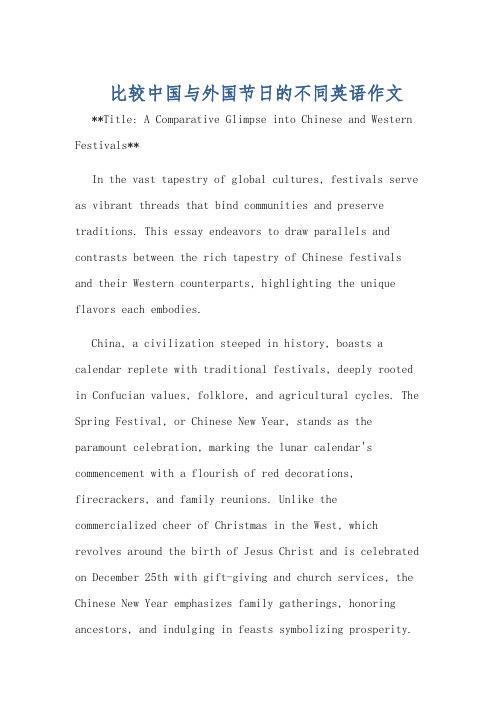
比较中国与外国节日的不同英语作文**Title: A Comparative Glimpse into Chinese and Western Festivals**In the vast tapestry of global cultures, festivals serve as vibrant threads that bind communities and preserve traditions. This essay endeavors to draw parallels and contrasts between the rich tapestry of Chinese festivals and their Western counterparts, highlighting the unique flavors each embodies.China, a civilization steeped in history, boasts a calendar replete with traditional festivals, deeply rooted in Confucian values, folklore, and agricultural cycles. The Spring Festival, or Chinese New Year, stands as the paramount celebration, marking the lunar calendar's commencement with a flourish of red decorations, firecrackers, and family reunions. Unlike the commercialized cheer of Christmas in the West, which revolves around the birth of Jesus Christ and is celebrated on December 25th with gift-giving and church services, the Chinese New Year emphasizes family gatherings, honoring ancestors, and indulging in feasts symbolizing prosperity.Contrastingly, while Western holidays such as Thanksgiving in the United States focus on gratitude and shared meals, mirroring the communal spirit of China's Mid-Autumn Festival where families gather to admire the full moon and enjoy mooncakes, they often lack the deep-rooted rituals found in Chinese traditions. The Dragon Boat Festival, commemorating the poet Qu Yuan, involves energetic dragon boat races and consuming zongzi, whereas Halloween in the West, with its roots in pagan harvest festivals, has evolved into a lighthearted event characterized by costumes and trick-or-treating.One salient difference lies in the philosophical underpinnings. Many Chinese festivals emphasize harmony with nature and respect for ancestors, as exemplified by the Qingming Festival, a time for tomb sweeping and remembrance. Conversely, Western celebrations like Easter, celebrating the resurrection of Jesus, underscore religious beliefs and renewal. Despite these disparities, both cultures share a common thread of using festivals to reinforce social bonds and transmit cultural heritage to successive generations.In conclusion, while Chinese and Western festivalsexhibit distinct characteristics shaped by their respective histories, religions, and societal structures, they universally reflect humanity's innate desire to celebratelife's milestones, express gratitude, and reinforce a sense of belonging. These festivities, in their colorful diversity, enrich our global cultural landscape and offer windows into the hearts and minds of diverse peoples.---**中国传统节日与西方节日的比较透视**在全球文化的大画卷中,节日犹如绚烂的丝线,将社区紧密相连,传承着古老的传统。
中西方春节的差异英语作文
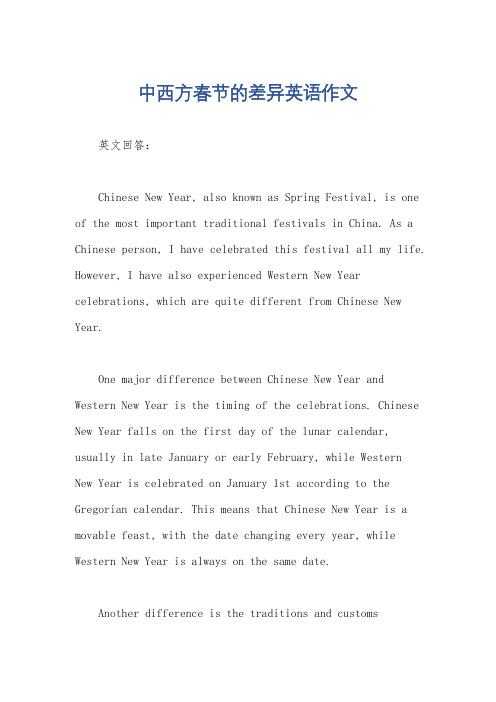
中西方春节的差异英语作文英文回答:Chinese New Year, also known as Spring Festival, is one of the most important traditional festivals in China. As a Chinese person, I have celebrated this festival all my life. However, I have also experienced Western New Year celebrations, which are quite different from Chinese New Year.One major difference between Chinese New Year and Western New Year is the timing of the celebrations. Chinese New Year falls on the first day of the lunar calendar, usually in late January or early February, while Western New Year is celebrated on January 1st according to the Gregorian calendar. This means that Chinese New Year is a movable feast, with the date changing every year, while Western New Year is always on the same date.Another difference is the traditions and customsassociated with the two festivals. During Chinese New Year, families gather for a reunion dinner on New Year's Eve, set off firecrackers to ward off evil spirits, and give red envelopes filled with money to children for good luck. On the other hand, Western New Year is often celebrated with parties, fireworks, and countdowns to midnight. People make New Year's resolutions and toast with champagne to welcome the new year.Furthermore, the symbolism of the two festivals is also different. Chinese New Year is a time to honor ancestors, pay respects to elders, and wish for good fortune in the coming year. The festival is filled with symbols of prosperity and good luck, such as the color red, the Chinese character for "fortune," and traditional foods like dumplings and fish. In contrast, Western New Year is often seen as a time for new beginnings, reflection, and setting goals for the future. The symbol of Western New Year is often a baby or a clock striking midnight.In conclusion, while both Chinese New Year and Western New Year are celebrations of new beginnings and freshstarts, they are marked by different traditions, timing,and symbolism. As someone who has experienced bothfestivals, I appreciate the unique aspects of each andenjoy celebrating them in their own ways.中文回答:中国的春节,也被称为春节,是中国最重要的传统节日之一。
高中英语作文:中国人应该庆祝西方节日吗?
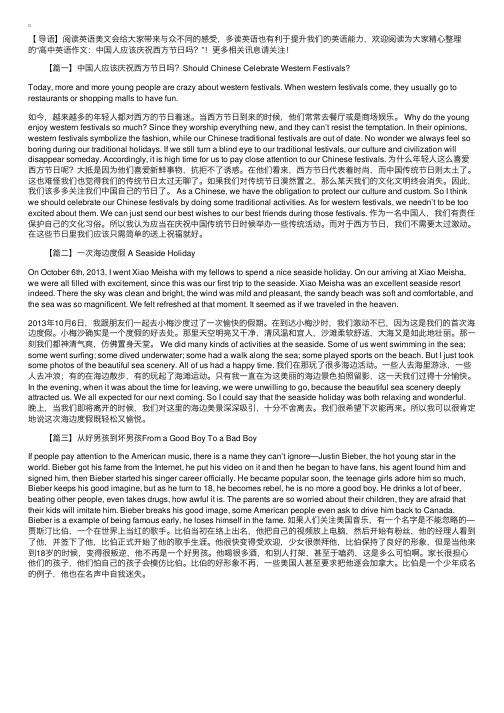
【导语】阅读英语美⽂会给⼤家带来与众不同的感受,多读英语也有利于提升我们的英语能⼒,欢迎阅读为⼤家精⼼整理的“⾼中英语作⽂:中国⼈应该庆祝西⽅节⽇吗?”!更多相关讯息请关注! 【篇⼀】中国⼈应该庆祝西⽅节⽇吗?Should Chinese Celebrate Western Festivals?Today, more and more young people are crazy about western festivals. When western festivals come, they usually go to restaurants or shopping malls to have fun.如今,越来越多的年轻⼈都对西⽅的节⽇着迷。
当西⽅节⽇到来的时候,他们常常去餐厅或是商场娱乐。
Why do the young enjoy western festivals so much? Since they worship everything new, and they can’t resist the temptation. In their opinions, western festivals symbolize the fashion, while our Chinese traditional festivals are out of date. No wonder we always feel so boring during our traditional holidays. If we still turn a blind eye to our traditional festivals, our culture and civilization will disappear someday. Accordingly, it is high time for us to pay close attention to our Chinese festivals. 为什么年轻⼈这么喜爱西⽅节⽇呢?⼤抵是因为他们喜爱新鲜事物,抗拒不了诱惑。
中西节日对比英语作文120字

中西节日对比英语作文120字英文回答:Chinese and Western festivals are two differentcultural traditions that have evolved over centuries. While they share some similarities, there are also many differences between them.One of the most obvious differences between Chinese and Western festivals is the way they are celebrated. Chinese festivals are typically celebrated with large feasts, fireworks, and other traditional activities. Western festivals, on the other hand, are often more focused on family gatherings and religious observances.Another difference between Chinese and Westernfestivals is the time of year in which they are celebrated. Chinese festivals are typically celebrated according to the lunar calendar, which means that they fall on different dates each year. Western festivals, on the other hand, aretypically celebrated according to the Gregorian calendar, which means that they fall on the same dates each year.Finally, Chinese and Western festivals have different origins. Chinese festivals are often rooted in ancient Chinese mythology and tradition, while Western festivalsare often rooted in Christian or other religious traditions.中文回答:中文回答:中国和西方节日是历经数个世纪发展演变而来的两种不同的文化传统。
中国的传统节日英语作文范文(精选28篇)

中国的传统节日英语作文中国的传统节日英语作文范文(精选28篇)在学习、工作乃至生活中,许多人都写过作文吧,作文是人们把记忆中所存储的有关知识、经验和思想用书面形式表达出来的记叙方式。
那么问题来了,到底应如何写一篇优秀的作文呢?下面是小编收集整理的中国的传统节日英语作文,供大家参考借鉴,希望可以帮助到有需要的朋友。
中国的传统节日英语作文篇1Mid Autumn Festival is a traditional festival of China. It used to be as important as Spring Festival .It is usually celebrated in September or October. This festival is to celebrate the harvest and to enjoy the beautiful moon light. To some extent, it is like Thanks Giving day in western countries. On this day, people usually get together with their families and have a nice meal. After that, people always eat delicious moon cakes, and watch the moon. The moon is always very round on that day, and makes people think of their relatives and friends. It is a day of pleasure and happiness.Hope you have a wonderful Mid Autumn festival!中国的传统节日英语作文篇2Mid Autumn Festival is a traditional festival of China.It used to be as important as Spring Festival.It is usually celebrated in September or October.This festival is to celebrate the harvest and to enjoy the beautiful moon light.T o some extent,it is like Thanks Giving day in western countries.On this day,people usually get together with their families and have a nice meal.After that,people always eat delicious moon cakes,and watch the moon.The moon is always very round on that day,and makes people think of their relatives and friends.Itis a day of pleasure and happiness.Hope you have a wonderful Mid Autumn festival!中国的传统节日英语作文篇3Mid Autumn Festival is a traditional festival of China. It used to be as important as Spring Festival .It is usually celebrated in September or October. This festival is to celebrate the harvest and to enjoy the beautiful moon light. To some extent, it is like Thanks Giving day in western countries. On this day, people usually get together with their families and have a nice meal.After that, people always eat delicious moon cakes, and watch the moon. The moon is always very round on that day, and makes people think of their relatives and friends. It is a day of pleasure and happiness. Hope you have a wonderful Mid Autumn festival!中国的传统节日英语作文篇4Chinese New year, also known as Losar, is the most important festival in the Tibetan calendar. This year, Tibetan New Years day coincides with the Spring Festival.Losar is celebrated for 15 days, but the first 3 days are most important. A series of folk activities will be held to celebrate. Losar is a time for family reunions and feasts, typically featuring Kharbse, a popular dish made from flour and yak milk butter and guthuk, a traditional snack similar to a dumpling.The square in front of the Potala Palace in the heart of Lhasa is spruced up with an ornamental garden and new flags made of colorfully-painted Tibetan clothing, which bear auspicious symbols for the new year.中国的传统节日英语作文篇5Chinese Spring Festival celebrating the end of winter and the warmth of spring. It began in the last day of the lunar year, endin the 15th day of lunar New Year, also is the Lantern Festival.During the Spring Festival, people use red lantern and Spring Festival couplets decorate a house, put on all kinds of colored clothes, often visit friends and relatives or together eat dumplings, fish, meat and other delicious food.The children are looking forward to receiving red envelope money, and together they play each other the fireworks, with happy. Streetwith dragon and lion dance and some other carnival activities, CCTV will held the grand Spring Festival gala.中国的传统节日英语作文篇6Hi! Tom,I’m glad to hear that you are interested in traditional Chinese festivals.My favorite festival is the Mid-Autumn Festival. It usually comes in September or October. On that day, our family members usually get together and have a nice meal. After that, I always admire the moon and share mooncakes with my families.I love this festival because I like eating mooncakes. They are in the shape of a full moon. They carry people’s wishes to the families they love and miss.In short, the Mid-Autumn Festival is a day of pleasure and happiness. I hope that my letter will help you know more about Chinese festivals.Yours,Li Hua中国的传统节日英语作文篇7Falling on the first day of the first month of the Chinese lunar calendar, the Spring Festival is in fact the Chinese New Year.Before it, people usually give their house a thoroughcleaning and do a lot of shopping. On the New Year’s Eve, people come home and the whole family have a big dinner together. On the New Year’s Day and the few days to follow, people often visit their relatives and friends to give one another their best wishes for the new year.Throughout this festival period firecrackers can be heard everywhere. This festival is the most important festival for the Chinese.中国的传统节日英语作文篇8今天是中秋节,爸爸妈妈带我去美丽的滨江公园放灯笼。
对传统节日和西方节日的看法 英语作文
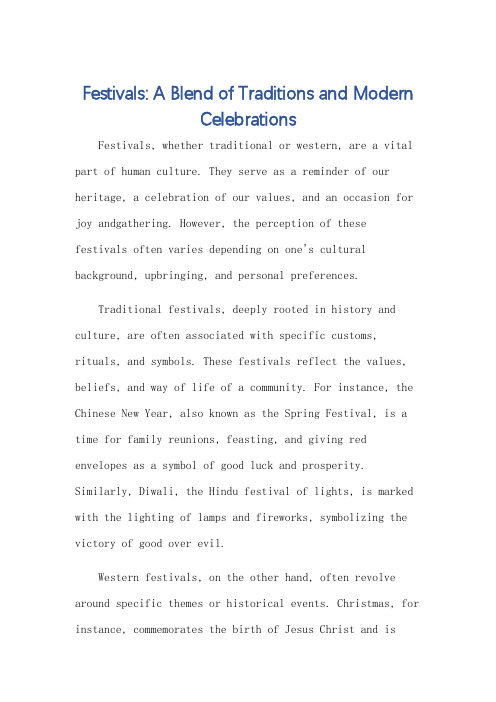
Festivals: A Blend of Traditions and ModernCelebrationsFestivals, whether traditional or western, are a vital part of human culture. They serve as a reminder of our heritage, a celebration of our values, and an occasion for joy andgathering. However, the perception of thesefestivals often varies depending on one's cultural background, upbringing, and personal preferences.Traditional festivals, deeply rooted in history and culture, are often associated with specific customs, rituals, and symbols. These festivals reflect the values, beliefs, and way of life of a community. For instance, the Chinese New Year, also known as the Spring Festival, is a time for family reunions, feasting, and giving red envelopes as a symbol of good luck and prosperity. Similarly, Diwali, the Hindu festival of lights, is marked with the lighting of lamps and fireworks, symbolizing the victory of good over evil.Western festivals, on the other hand, often revolve around specific themes or historical events. Christmas, for instance, commemorates the birth of Jesus Christ and ismarked with gift-giving, feasting, and the装饰of Christmas trees and houses with lights and ornaments. Valentine's Day, on the other hand, is a celebration of love, with people exchanging cards, flowers, and gifts with their loved ones. While traditional festivals often carry deeper cultural and historical significance, western festivals have also gained popularity in recent years. This is partly due tothe influence of globalization, which has led to the spread of western culture and its festivals across the globe. Additionally, the media and advertising industries have played a crucial role in promoting these festivals, making them more accessible and appealing to a wider audience.However, it is important to note that the celebrationof western festivals does not necessarily mean a disregard for traditional festivals. In fact, many people celebrate both types of festivals, recognizing their unique value and significance. For instance, many Indians celebrate Diwali with all its traditional customs and rituals while also partaking in the festivities of Christmas, Halloween, or other western festivals.In conclusion, festivals serve as a bridge between our past and present, connecting us to our heritage and culture while also allowing us to embrace new traditions and celebrate diversity. Whether we choose to celebrate traditional or western festivals, or both, the important thing is to appreciate their value and meaning and to share the joy and unity they bring.**节日:传统与现代庆祝活动的融合**节日,无论是传统的还是西方的,都是人类文化的重要组成部分。
英语作文西方节日和中国传统节日
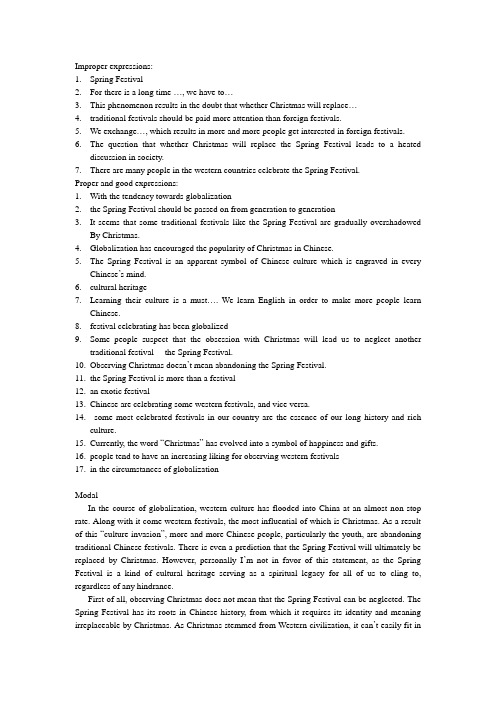
Improper expressions:1.Spring Festival2.For there is a long time …, we have to…3.This phenomenon results in the doubt that whether Christmas will replace…4.traditional festivals should be paid more attention than foreign festivals.5.We exchange…, which results in more and more people get interested in foreign festivals.6.The question that whether Christmas will replace the Spring Festival leads to a heateddiscussion in society.7.There are many people in the western countries celebrate the Spring Festival.Proper and good expressions:1.With the tendency towards globalization2.the Spring Festival should be passed on from generation to generation3.It seems that some traditional festivals like the Spring Festival are gradually overshadowedBy Christmas.4.Globalization has encouraged the popularity of Christmas in Chinese.5.The Spring Festival is an apparent symbol of Chinese culture which is engraved in everyChinese’s mind.6.cultural heritage7.Learning their culture is a must…. We learn English in order to make more people learnChinese.8.festival celebrating has been globalized9.Some people suspect that the obsession with Christmas will lead us to neglect anothertraditional festival--- the Spring Festival.10.Observing Christmas doesn’t mean abandoning the Spring Festival.11.the Spring Festival is more than a festival12.an exotic festival13.Chinese are celebrating some western festivals, and vice versa.14.some most celebrated festivals in our country are the essence of our long history and richculture.15.Currently, the word “Christmas” has evolved into a symbol of happiness and gifts.16.people tend to have an increasing liking for observing western festivals17.in the circumstances of globalizationModalIn the course of globalization, western culture has flooded into China at an almost non-stop rate. Along with it come western festivals, the most influential of which is Christmas. As a result of this “culture invasion”, more and more Chinese people, particularly the youth, are abandoning traditional Chinese festivals. There is even a prediction that the Spring Festival will ultimately be replaced by Christmas. However, personally I’m not in favor of this statement, as the Spring Festival is a kind of cultural heritage serving as a spiritual legacy for all of us to cling to, regardless of any hindrance.First of all, observing Christmas does not mean that the Spring Festival can be neglected. The Spring Festival has its roots in Chinese history, from which it requires its identity and meaning irreplaceable by Christmas. As Christmas stemmed from Western civilization, it can’t easily fit inwith Chinese society, let alone take the place of the Spring Festival.Secondly, the Spring Festival expresses our true emotions while Christmas cannot. Often, the Spring Festival arouses a feeling of eternal harmony, creates a sense of happiness, and conveys a message of family. However, Christmas goes no further than one night’s pleasure or some fancy presents, which is surely to fade away with passing tide of time and memory.The Spring Festival is not going to lose its vigor to Christmas, as it’s just like a warm beacon for all the Chinese to gather around to cheer, to dream and to carry on.春节作文写春节作文前,我们可以先回忆下过春节是我们参加过的活动,如贴倒福、分压岁钱、吃饺子、掸扬尘、贴年画、贴剪纸、放鞭炮、守岁、给压岁钱、挂千千结、贴春联等,然后挑一个我们印象深刻的上网查些资料,可以到百度搜春节的八个习俗,春节的由来与传说等,也可以上作文网作文素材频道找到相关资料再进行介绍。
中西方节日差异英语作文500字
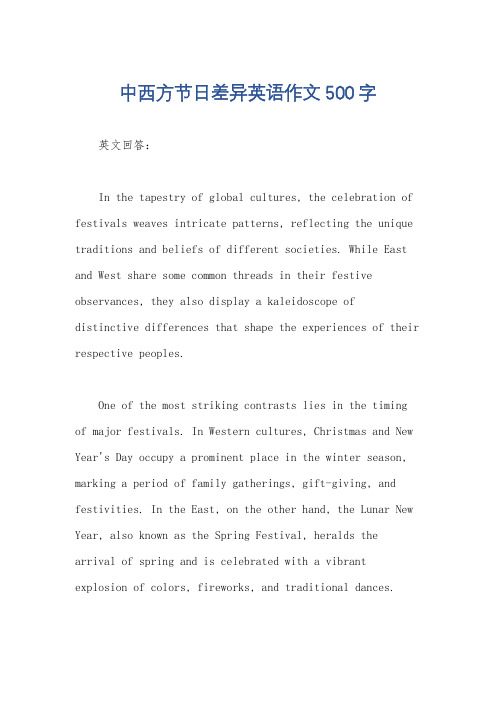
中西方节日差异英语作文500字英文回答:In the tapestry of global cultures, the celebration of festivals weaves intricate patterns, reflecting the unique traditions and beliefs of different societies. While East and West share some common threads in their festive observances, they also display a kaleidoscope ofdistinctive differences that shape the experiences of their respective peoples.One of the most striking contrasts lies in the timing of major festivals. In Western cultures, Christmas and New Year's Day occupy a prominent place in the winter season, marking a period of family gatherings, gift-giving, and festivities. In the East, on the other hand, the Lunar New Year, also known as the Spring Festival, heralds thearrival of spring and is celebrated with a vibrant explosion of colors, fireworks, and traditional dances.Another notable difference lies in the symbolism associated with festivals. In the West, Christmas is often associated with the birth of Jesus Christ and themes of love, joy, and charity. The iconography of Santa Claus, with his red suit and gift-bearing sleigh, has become an inseparable part of the Christmas tradition. In contrast, the Lunar New Year in the East is steeped in ancient myths and legends, honoring ancestors, promoting family unity, and bringing good luck for the year ahead.The duration of festivals also varies significantly between East and West. Western festivals tend to be concentrated within a shorter timeframe, typically lasting a few days or weeks. Christmas celebrations, for example, focus on the 25th of December, while New Year's Eve is marked by a night of fireworks and revelry. In the East, festivals often extend over several weeks, allowing for a more extended period of celebration. The Lunar New Year,for instance, spans over 15 days, with each day holding its own unique set of customs and rituals.Finally, the nature of festivities themselves presentsmarked variations. Western festivals often emphasize public gatherings, with events such as Christmas markets, holiday parades, and community celebrations. In the East, festivals tend to be more centered around family and private gatherings, with emphasis on traditions such as sharing meals, honoring elders, and performing ancestral rituals.In conclusion, East and West display a rich diversity in their festival traditions, reflecting the unique tapestry of beliefs, customs, and values that define their respective cultures. While some common themes may intertwine, the distinctive differences in timing, symbolism, duration, and nature of their celebrations add a vibrant and multifaceted dimension to the global celebration of life and community.中文回答:东西方节日差异。
西方节日对中国传统文化的影响英语作文

西方节日对中国传统文化的影响英语作文The Impact of Western Festivals on Chinese Traditional CultureIntroductionAs globalization continues to shape the world we live in, the influence of Western festivals on Chinese traditional culture has become increasingly prevalent. While Chinese culture has a rich history and long-standing traditions, the influx of Western holidays such as Christmas, Halloween, and Valentine's Day has begun to reshape the way that Chinese people celebrate important events and festivities. In this essay, we will explore the impact of Western festivals on Chinese traditional culture and discuss the implications of this cultural exchange.Historical BackgroundChina has a long history of celebrating traditional festivals such as the Lunar New Year, the Dragon Boat Festival, and the Mid-Autumn Festival. These festivals are deeply rooted in Chinese culture and have been celebrated for centuries as a way to honor the country's rich history and traditions. However, with the increasing globalization of the world, Western festivals have started to gain popularity in China as well. Christmas, forexample, has become widely celebrated in major Chinese cities, with decorations, gifts, and festive events becoming commonplace during the holiday season.Impact on Chinese CultureThe introduction of Western festivals in China has had a significant impact on Chinese culture in a variety of ways. One of the most noticeable changes is the way that young people in China celebrate holidays. Traditionally, Chinese festivals were marked by family gatherings, feasting, and rituals that honored ancestors and traditions. However, with the influence of Western holidays, young people in China are now more likely to exchange gifts, attend parties, and engage in other Western-style celebrations during holidays such as Christmas and Valentine's Day.Furthermore, the commercialization of Western festivals has also impacted Chinese culture. In recent years, businesses in China have capitalized on the popularity of holidays such as Christmas and Halloween by marketing products and services to consumers. This commercialization has led to an increase in consumerism during these holidays, with many people in China now spending money on gifts, decorations, and otherholiday-related items.Cultural ExchangeWhile the influence of Western festivals on Chinese culture has raised concerns about the erosion of traditional values and customs, it has also sparked a cultural exchange that has enriched both Chinese and Western traditions. For example, the celebration of Christmas in China has led to a greater understanding and appreciation of Western culture among Chinese people, while also allowing for the sharing of Chinese traditions with people from other countries.Moreover, the blending of Western and Chinese traditions has created opportunities for new forms of cultural expression and creativity. For example, the growing popularity of Halloween in China has led to the emergence of unique celebrations that combine elements of both Western and Chinese folklore and traditions. This blending of cultures has created a rich tapestry of customs and practices that reflect the diversity and vibrancy of modern Chinese society.ConclusionIn conclusion, the impact of Western festivals on Chinese traditional culture has been both transformative and complex. While the introduction of Western holidays has brought about changes in the way that Chinese people celebrate importantevents and festivities, it has also facilitated a cultural exchange that has enriched both Chinese and Western traditions. As China continues to embrace globalization, it is likely that the influence of Western festivals will continue to shape and evolve Chinese culture in new and exciting ways.。
东西方节日的异同英语作文小学
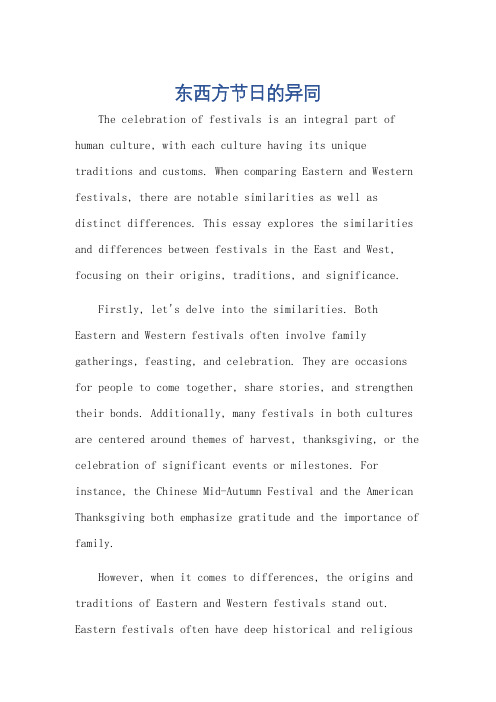
东西方节日的异同The celebration of festivals is an integral part of human culture, with each culture having its unique traditions and customs. When comparing Eastern and Western festivals, there are notable similarities as well as distinct differences. This essay explores the similarities and differences between festivals in the East and West, focusing on their origins, traditions, and significance.Firstly, let's delve into the similarities. Both Eastern and Western festivals often involve family gatherings, feasting, and celebration. They are occasions for people to come together, share stories, and strengthen their bonds. Additionally, many festivals in both cultures are centered around themes of harvest, thanksgiving, or the celebration of significant events or milestones. For instance, the Chinese Mid-Autumn Festival and the American Thanksgiving both emphasize gratitude and the importance of family.However, when it comes to differences, the origins and traditions of Eastern and Western festivals stand out. Eastern festivals often have deep historical and religiousroots. For example, the Chinese Spring Festival, also known as the Chinese New Year, is a festival with over 4000 years of history, rooted in ancient agricultural traditions andthe lunar calendar. It's a time for family reunions, fireworks, and the giving of red envelopes as symbols of good luck and prosperity. Similarly, the Indian Diwali, a festival of lights, is a celebration of good over evil anda symbol of hope and renewal.On the other hand, Western festivals often have more secular origins, with many of them evolving from pagan customs or historical events. Christmas, for instance,while now celebrated as a religious holiday by Christians, originated from pagan festivals marking the winter solstice. It's now associated with gift-giving, festive decorations, and the iconic figure of Santa Claus. The American Independence Day, on the other hand, commemorates a significant historical event - the Declaration of Independence from Great Britain.Another significant difference lies in the celebration styles. Eastern festivals tend to be more festive andlively, with vibrant colors and loud celebrations. The useof fireworks, dragon dances, and other lively performances are common during festivals like the Chinese New Year or the Indian Holi. In contrast, Western festivals may have a more subdued tone, emphasizing the spirit of giving, reflection, and gratitude. Christmas, for example, is a time for quiet family gatherings, singing carols, and exchanging gifts.Furthermore, the foods associated with these festivals also differ greatly. Eastern festivals often feature a range of traditional dishes that are unique to the culture. Dumplings, spring rolls, and mooncakes are staples of Chinese festivals, while Indian festivals might include sweets like ladoos and jalebis. Western festivals, on the other hand, might involve more of a mix of traditional and non-traditional foods. Christmas, for instance, is knownfor its roast turkey, mince pies, and Christmas pudding, while Thanksgiving is centered around a feast of roasted meats, potatoes, and pies.In conclusion, while Eastern and Western festivals share some similarities in terms of their purpose and the spirit of celebration, they differ significantly in theirorigins, traditions, and celebration styles. These differences reflect the rich cultural diversity of theworld and make each festival unique and memorable. As we continue to learn and appreciate these differences, we gain a deeper understanding of the various cultures andtraditions that make up our global community.**东西方节日的异同**节日的庆祝是人类文化的重要组成部分,每种文化都有自己独特的传统和习俗。
- 1、下载文档前请自行甄别文档内容的完整性,平台不提供额外的编辑、内容补充、找答案等附加服务。
- 2、"仅部分预览"的文档,不可在线预览部分如存在完整性等问题,可反馈申请退款(可完整预览的文档不适用该条件!)。
- 3、如文档侵犯您的权益,请联系客服反馈,我们会尽快为您处理(人工客服工作时间:9:00-18:30)。
Improper expressions:
1.Spring Festival
2.For there is a long time …, we have to…
3.This phenomenon results in the doubt that whether Christmas will replace…
4.traditional festivals should be paid more attention than foreign festivals.
5.We exchange…, which results in more and more people get interested in foreign festivals.
6.The question that whether Christmas will replace the Spring Festival leads to a heated
discussion in society.
7.There are many people in the western countries celebrate the Spring Festival.
Proper and good expressions:
1.With the tendency towards globalization
2.the Spring Festival should be passed on from generation to generation
3.It seems that some traditional festivals like the Spring Festival are gradually overshadowed
By Christmas.
4.Globalization has encouraged the popularity of Christmas in Chinese.
5.The Spring Festival is an apparent symbol of Chinese culture which is engraved in every
Chinese’s mind.
6.cultural heritage
7.Learning their culture is a must…. We learn English in order to make more people learn
Chinese.
8.festival celebrating has been globalized
9.Some people suspect that the obsession with Christmas will lead us to neglect another
traditional festival--- the Spring Festival.
10.Observing Christmas doesn’t mean abandoning the Spring Festival.
11.the Spring Festival is more than a festival
12.an exotic festival
13.Chinese are celebrating some western festivals, and vice versa.
14.some most celebrated festivals in our country are the essence of our long history and rich
culture.
15.Currently, the word “Christmas” has evolved into a symbol of happiness and gifts.
16.people tend to have an increasing liking for observing western festivals
17.in the circumstances of globalization
Modal
In the course of globalization, western culture has flooded into China at an almost non-stop rate. Along with it come western festivals, the most influential of which is Christmas. As a result of this “culture invasion”, more and more Chinese people, particularly the youth, are abandoning traditional Chinese festivals. There is even a prediction that the Spring Festival will ultimately be replaced by Christmas. However, personally I’m not in favor of this statement, as the Spring Festival is a kind of cultural heritage serving as a spiritual legacy for all of us to cling to, regardless of any hindrance.
First of all, observing Christmas does not mean that the Spring Festival can be neglected. The Spring Festival has its roots in Chinese history, from which it requires its identity and meaning irreplaceable by Christmas. As Christmas stemmed from Western civilization, it can’t easily fit in
with Chinese society, let alone take the place of the Spring Festival.
Secondly, the Spring Festival expresses our true emotions while Christmas cannot. Often, the Spring Festival arouses a feeling of eternal harmony, creates a sense of happiness, and conveys a message of family. However, Christmas goes no further than one night’s pleasure or some fancy presents, which is surely to fade away with passing tide of time and memory.
The Spring Festival is not going to lose its vigor to Christmas, as it’s just like a warm beacon for all the Chinese to gather around to cheer, to dream and to carry on.。
